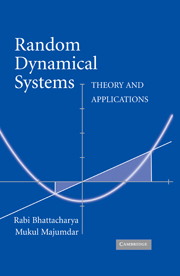
-
Select format
-
- Publisher:
- Cambridge University Press
- Publication date:
- 20 February 2010
- 08 January 2007
- ISBN:
- 9780511618628
- 9780521825658
- 9780521532723
- Dimensions:
- (228 x 152 mm)
- Weight & Pages:
- 0.742kg, 480 Pages
- Dimensions:
- (228 x 152 mm)
- Weight & Pages:
- 0.626kg, 480 Pages
You may already have access via personal or institutional login
Book description
This treatment provides an exposition of discrete time dynamic processes evolving over an infinite horizon. Chapter 1 reviews some mathematical results from the theory of deterministic dynamical systems, with particular emphasis on applications to economics. The theory of irreducible Markov processes, especially Markov chains, is surveyed in Chapter 2. Equilibrium and long run stability of a dynamical system in which the law of motion is subject to random perturbations is the central theme of Chapters 3-5. A unified account of relatively recent results, exploiting splitting and contractions, that have found applications in many contexts is presented in detail. Chapter 6 explains how a random dynamical system may emerge from a class of dynamic programming problems. With examples and exercises, readers are guided from basic theory to the frontier of applied mathematical research.
Reviews
'This reviewer has all the arguments to recommend the book strongly not only to institutional libraries but also to anybody who is studying, teaching or using stochastic models. With its contents and style of presentation this attractive book will be very useful to postgraduate students in several areas, among them mathematics, statistics or probability, economics, biology or engineering.'
Source: Journal of the Royal Statistical Society
Contents
Metrics
Altmetric attention score
Full text views
Full text views help Loading metrics...
Loading metrics...
* Views captured on Cambridge Core between #date#. This data will be updated every 24 hours.
Usage data cannot currently be displayed.
Accessibility standard: Unknown
Why this information is here
This section outlines the accessibility features of this content - including support for screen readers, full keyboard navigation and high-contrast display options. This may not be relevant for you.
Accessibility Information
Accessibility compliance for the PDF of this book is currently unknown and may be updated in the future.


